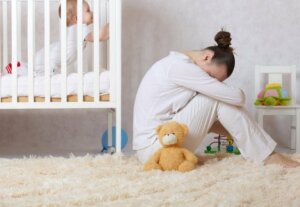How to Recognize Postpartum Depression and Treat it

While a baby’s arrival is a very exciting time for the family, some mothers may feel consumed by an inexplicable and intense feeling of sadness that lasts for several days. In this article, we’ll talk about how to recognize postpartum depression.
According to a study by the Autonomous University of Barcelona, this type of depression affects 10-15% of women. In fact, even a planned pregnancy won’t prevent this state. Apparently, the sudden drop in hormones that the body experiences after the baby is born may be a key trigger for your symptoms. However, they aren’t the only causes.
The most concerning thing for those who suffer from postpartum depression is usually the issue of facing social and familial prejudices. Even though it’s a common problem, there are still many people who don’t think it’s an important issue or who don’t take the time to understand it. For that reason, many women suppress their feelings to appear fine and happy. Let’s go deeper.
What’s postpartum depression?

At first, this disorder may be confused with postpartum blues. However, the difference is that with postpartum depression the symptoms are more intense and lasting. Additionally, they interfere with the woman’s ability to care for her baby and perform day-to-day tasks.
This is because women often experience great difficulties in establishing a bond with their child, while they’re also experiencing thoughts of worthlessness for not being a good mother.
Many women are ashamed of how they feel. They don’t want to ask for help because giving birth is supposed to be an exciting and joyful part of life. However, it’s important to keep in mind that there isn’t only one way to properly deal with motherhood. For that reason, it’s important to ask for help when you’re not feeling well.
Read also: Skin-to-Skin Contact: Essential After Childbirth
How to recognize postpartum depression
As we mentioned earlier, it can be difficult to recognize postpartum depression, as it may be a simple reaction to the tiredness and stress of motherhood. However, when you’re experiencing a state of intense sadness and despair, you should start to think it may be a real problem. Here are some of the main symptoms:
- Feelings of sadness, emptiness and hopelessness
- Intense and prolonged crying, without knowing why
- Loss of interest in activities that were enjoyable
- Excessive worries about this new stage
- Inability to bond with the baby
- Difficulties sleeping at night and drowsiness
- Lack of appetite or, on the contrary, too much anxiety about food
- Feeling excessive guilt or worthlessness
- Feeling agitated or lazy
- Loss of concentration and difficulty making decisions
- Constant irritation or anger
- Social and familial isolation
- Loss of interest in caring for the baby
- Feeling very tired and unable to get out of bed
How do you treat postpartum depression?

It’s difficult to determine how long postpartum depression will last, but most cases improve within weeks. Doctors recommend starting treatment from the beginning. If not, the symptoms may be prolonged.
Postpartum depression is treated similarly to any other depression. However, before resorting to medication, it’s recommended to start with psychological therapy sessions. This is especially true if the mother is breastfeeding the baby.
Psychotherapy can be carried out individually or in a group. If necessary, you may want to try out family therapy, so you can work with your partner or a close relative.
In addition to those treatments, it’s best for the mother to rest well and adopt a healthy diet. Consistent practice of healthy habits helps to improve mood and decrease the risk of relapse.
Read also: Learn about Childbirth Preparation Classes
Strategies to prevent postpartum depression

- Get a good night’s sleep every day and try to rest when necessary.
- Seek support from other mothers who have gone through a similar situation.
- Go out for a walk daily and take advantage of gentle exercise: walking or stretching.
- Don’t compare yourself to other people.
- Simplify household chores, this isn’t the time for your house to be sparkling clean.
- Postpone visits so that you can rest.
- Eat foods that are shown to improve your mood.
- Increase your water and healthy liquids intake (juices, broths, teas).
- Spend some time with your partner.
- Find distractions (shopping, watching a movie, eating with your family).
- Practice deep breathing and relaxation methods.
- Work on your self-esteem.
- Resolve any doubts you have about your abilities as a mother.
Do you think you’re experiencing some symptoms of postpartum depression? Don’t ignore them! Even if you’re worried about being judged, it’s essential that you ask for help so that you can face this issue. If you suppress how you feel, you may start to feel even worse over time.
All cited sources were thoroughly reviewed by our team to ensure their quality, reliability, currency, and validity. The bibliography of this article was considered reliable and of academic or scientific accuracy.
- Lim G et al. “Labor Analgesia as a Predictor for Reduced Postpartum Depression Scores: A Retrospective Observational Study”, Anesth Analg. 2018 May;126(5):1598-1605. doi: 10.1213/ANE.0000000000002720.
- Oksana V. Riazanova et al. “The relationship between labor pain management, cortisol level and risk of postpartum depression development: a prospective nonrandomized observational monocentric trial”, Romanian Journal of Anaesthesia and Intensive Care 2018 Vol 25 No 2, 123-130
- Ding, Ting et al. “Epidural Labor Analgesia Is Associated with a Decreased Risk of Postpartum Depression. A Prospective Cohort Study”, Anesthesia & Analgesia: August 2014 – Volume 119 – Issue 2 – p 383–392 doi: 10.1213/ANE.0000000000000107
This text is provided for informational purposes only and does not replace consultation with a professional. If in doubt, consult your specialist.








